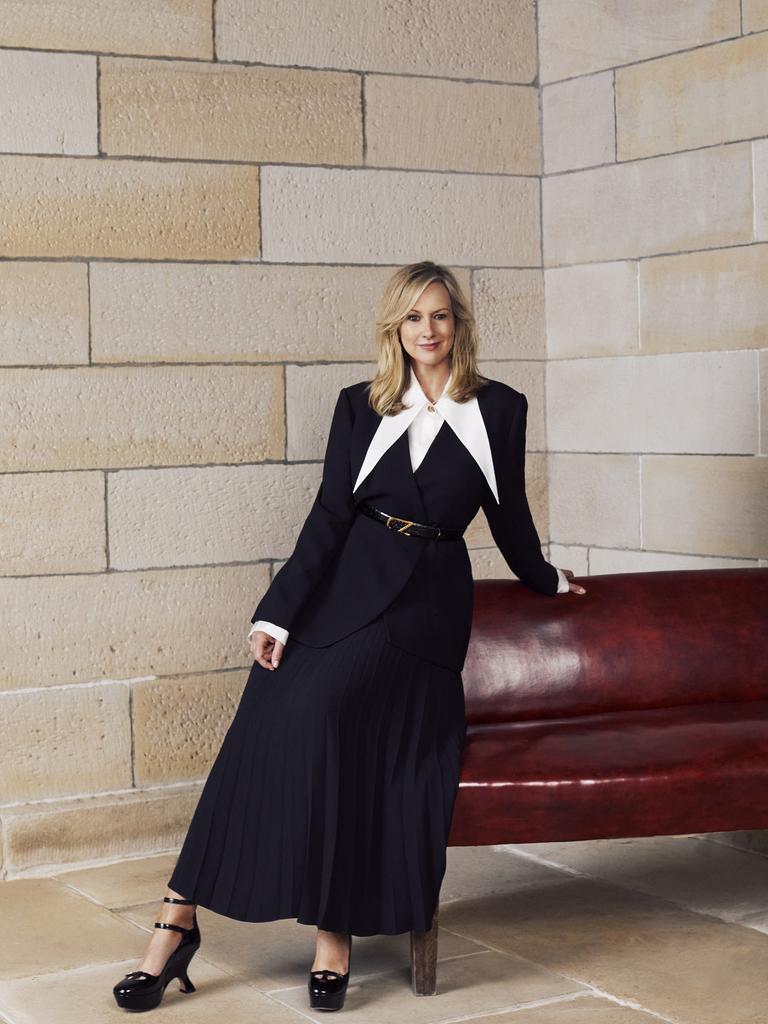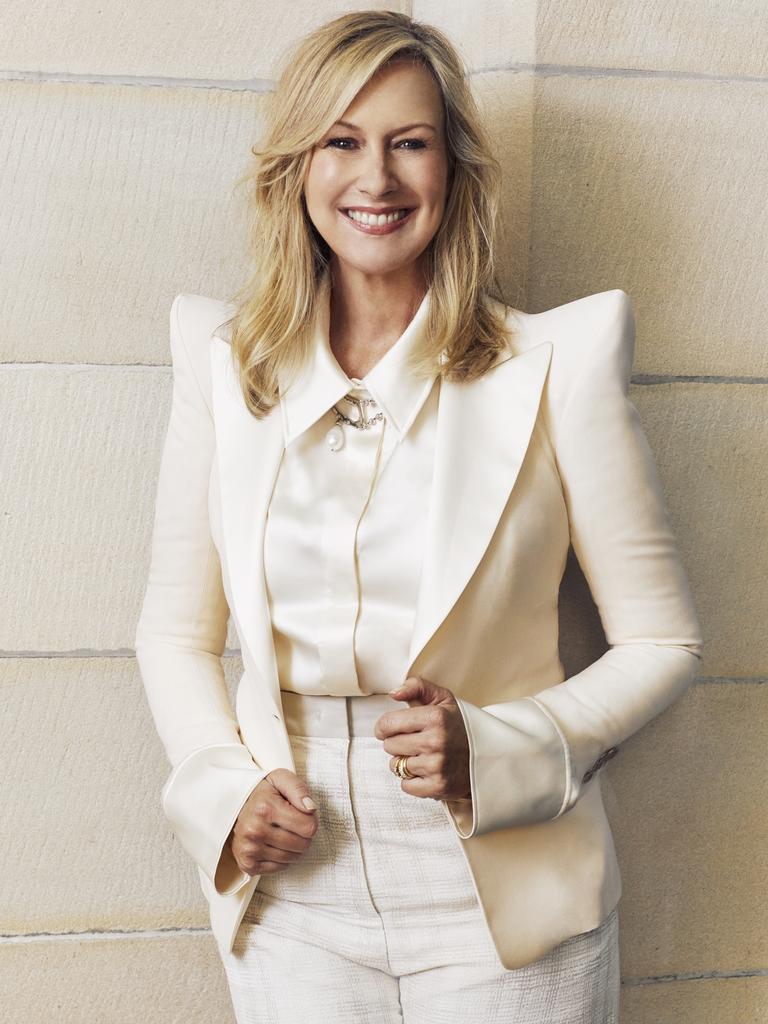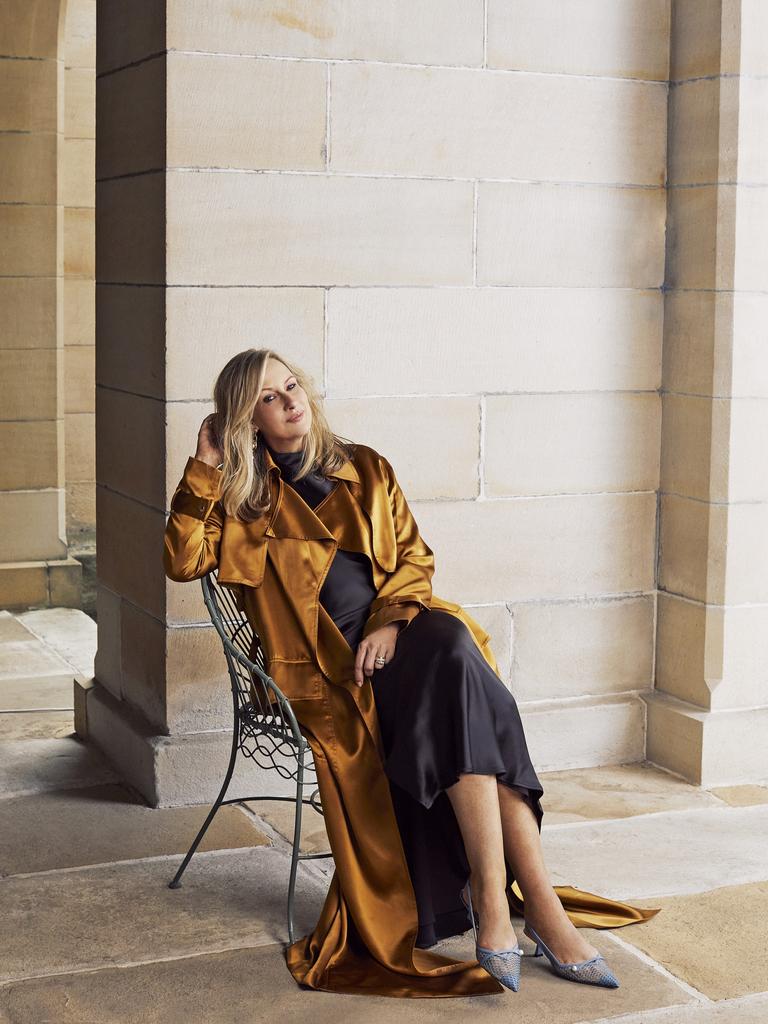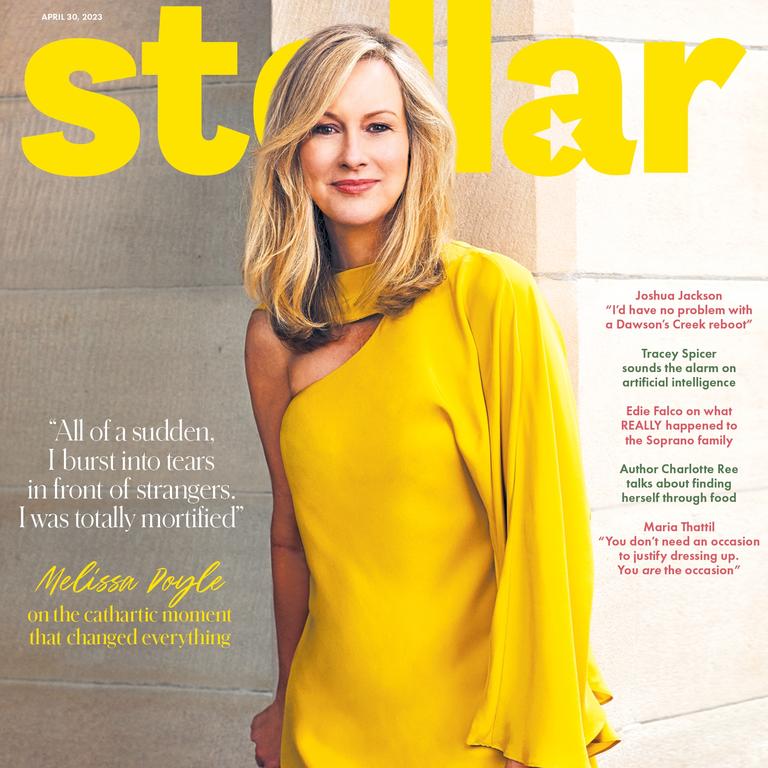Former Sunrise host Melissa Doyle cried on ageism, cosmetic surgery – and the real reason she cried in front of strangers
Former Sunrise co-host Melissa Doyle has opened up about ageing in the public eye, cosmetic surgery – and the emotional moment that forced a personal breakthrough.
Stellar
Don't miss out on the headlines from Stellar. Followed categories will be added to My News.
Famed for her steady on-air presence as a veteran television journalist, Melissa Doyle never thought she was lacking in confidence. But being let go by the Seven Network, her employer for 25 years, left her at a crossroads. Attending a women’s circle, however, led
the normally guarded Doyle to a breakthrough: talking openly about life beyond children, marriage and career isn’t a shameful thing – it’s liberating. Now, Doyle and her Age Against The Machine podcast co-host Naima Brown have written a book empowering women
to grow old on their own terms. As Doyle tells Stellar, “Yes, our bodies and minds are different, but that doesn’t necessarily mean they’re worse. Different can be better”
For too long, Melissa Doyle believes, the public has been fed a narrow framework of ageing. She cites how quickly paparazzi images went viral in 2008 of a then 63-year-old Helen Mirren sporting a red bikini while on an Italian holiday, the actor trotted out as the patron saint of growing old with style and chutzpah.
“We absolutely adore her and she’s very talented,” Doyle says, “but her circumstances are very different to a woman born in a poverty-stricken situation in an undeveloped country, where getting older means you’re completely discarded.”

If Doyle’s most notable role, as a co-host of the Seven Network’s Sunrise breakfast television show from 2002 to 2013, involved jumping deftly between multiple subjects and guests, the journalist tells Stellar that her latest project is a pointed look into the singular topic of ageing: health, work, money, looks, power, invisibility, grief and end-of-life planning.
She and Naima Brown, a writer and documentary producer, have described their new book, How To Age Against The Machine, as What To Expect When You’re Expecting for the second half of life.
“Ageing is one of those events we don’t plan for,” Doyle explains.
“We plan for our education and our career, and when we’re going to get married and have children, and where we’re going to live; but ageing creeps up on you. One day you see a photo and you suddenly think, oh my gosh, when did I get to that age?”
Although her personal experience with growing older isn’t chronicled in the book’s pages, Doyle acknowledges that, at the age of 53, she is well-placed to conduct a deep dive into ageing.
Indeed, when she notes that women over 50 were among the first to be made redundant by major companies that were downsizing during Covid, some might draw parallels with the end of her own 25-year career with the Seven Network in August 2020.

At the time, her vulnerability was tangible (“I wouldn’t say it came as a total shock, I just felt really sad,” she told Stellar a month after parting ways with her long-time employer) but almost three years later, her busy portfolio proves that women are eminently hireable after 50.
Along with this project, she has written 15 Seconds Of Brave, chronicling human stories of triumph over circumstance; hosted the reboot of This Is Your Life for the Seven Network; and voiced the documentary series Australia Behind Bars for her former competitor, the Nine Network.
Coupled with multiple charity endeavours – including a trip to Africa with World Vision – and completing a business directors course with the Australian Institute of Company Directors, she laughingly admits that she may be a little too busy.
“[It’s thought] that women over 50 may not be as adaptable as a 25-year-old, but that perception is not necessarily true,” she argues.
“Yes, our bodies and minds are different, but that doesn’t necessarily mean they’re worse. Different can be better. As a journalist in my 50s, I’m a lot better than I was in my 20s because of my life experiences.
The things I’ve seen and done and been exposed to have filled my cup, and we need to remind ourselves and each other that there’s a difference between becoming an elder and becoming elderly.”
She tapped into that wisdom a couple of years ago when her friend and co-author Brown convinced her to attend a women’s circle in Byron Bay, NSW.
Not prone to oversharing and unfamiliar with rituals involving talking bowls and burning sage at the gatherings, Doyle says she was confident nonetheless that she could speak matter-of-factly about some of the challenges of empty nest syndrome and ageing parents.
“I was a bit sceptical about holding the bowl and talking about my feelings, but
I went in open-minded,” she says.
“There was a lot going on in my life: my mother-in-law had just been hospitalised, my son was getting ready to move overseas, and work was changing. All of a sudden, boom, I burst into tears in front of this group of strangers and was totally mortified.”
When she recovered, Doyle realised that sharing her experiences with women
in similar circumstances was not only powerful but also cathartic.

She and Brown then concluded that, unlike the widely discussed milestones in early womanhood such as puberty, working, pregnancy, and childbirth, ageing was under-explored and generally dismissed as undesirable, problematic and something women should work hard to avoid. They weren’t buying it.
Instead, the pair decided to lift the lid on ageing, first through their resonant 2021 podcast Age Against The Machine and now with their comprehensive yet celebratory how-to book, subtitled An Empowering Guide For Women Ageing On Their Own Terms.
They wanted to encourage women to break out of what they call the “age cage” and set a new paradigm for a critical life stage previously governed by old values, structures and social mores.
To wit: in the weeks leading up to Doyle’s interview with Stellar, Madonna’s appearance as a presenter at the Grammy Awards on February 5 was eclipsed by social-media commentary about the 64-year-old singer’s face, while fresh images of Bette Midler, 77, at the Costume Designers Guild Awards on February 27 were followed by her cheery admission that she had undergone some face “tailoring”.
While Doyle won’t reference anyone by name, she’s surprised so many celebrities have had invasive procedures to maintain a visage of youth.
“I feel sad someone feels they need to change so much to live up to others’ expectations,” she says.
“If a woman has gone through a life-changing situation or heartbreak and that’s what she wants to do to make herself feel better or stronger, then go for it, but do it for you. Don’t do it for the commentators or the red carpet.”
Doyle thinks we need to reframe the beauty conversation away from anti-ageing and towards the concept of positive ageing.
“Ageing is natural,” she says. “It happens to us from the day we’re born. So why do we fight it? I’m not going to pretend there aren’t moments when I look in the mirror and wish I didn’t have so many laughter lines or [realise] my face looks a certain way it didn’t 20 years ago, but it’s OK, it’s natural.”
Citing 58-year-old former supermodel Paulina Porizkova, Doyle points out that while she is more genetically blessed than the average woman, even she was concerned about how others saw her.
In her contribution to Doyle’s book, Porizkova questions why women want to erase the road maps of their lives and “look like we are our own children”, an endeavour that “takes a bloody huge amount of time and money and energy”.
While similar wisdom is garnered from other high-profile women such as TV host Julia Morris, former politician Julie Bishop and Paralympian Libby Kosmala, Doyle and Brown widened their examination with a broad cultural and socio-economic approach. A high priestess from Ghana shares her country’s ceremonies around death while Doyle says interviewing a homeless woman in her car was deeply affecting.

You have to imagine that such a thorough examination of the subject might have provided Doyle with some tips as she navigates a new career and changes in her family – her son Nick, 22, is now studying in the US, while daughter Talia, 19, is at university in Sydney.
Doyle laughs as she offers that freedom is one benefit of ageing, noting that she and husband John Dunlop recently spent a week together in Japan without their grown-up children.
Her research, she adds, has prompted her to talk to her parents about what sort of care and decisions they might make as they get older. She’s also taken her vitamins out of the cupboard and put them on the bench where she’ll remember to take them.
Mostly, though, “The thing that struck me is how lucky I am,” Doyle says. “I’m so incredibly privileged to have stability, education and access to health services and people who can answer my questions.
We can’t just take it for granted because there are a hell of a lot of things worse than getting older.”
She’s also discovered that she didn’t need to be so scared when she was let go by the Seven Network.
“I feel empowered,” she tells Stellar. “I’m at a stage of my life where I’m doing projects like this that matter and make me feel relevant and purposeful. I’m invigorated, it’s great for my brain and I’m always thinking about what I can do next and what I can try next.”
Doyle insists she’s also become more attentive to her own health – while a regular at the gym, she’s always happy to indulge in the little things.
“If I want wine and cheese, I have it,” she states. “If something brings you pleasure, enjoy it. Who knows how long we’ll be here? I choose to do these things because they make me happy.”
How To Age Against The Machine by Melissa Doyle and Naima Brown (Hardie Grant Books, $45) is out on Wednesday.
Originally published as Former Sunrise host Melissa Doyle cried on ageism, cosmetic surgery – and the real reason she cried in front of strangers








